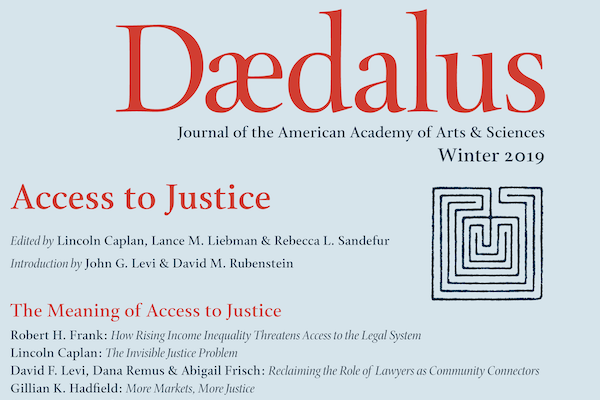David F. Levi, director of the Bolch Judicial Institute of Duke Law School, is among several leaders of the legal profession to contribute to the new Winter 2019 “Access to Justice” edition of Dædalus, the Journal of the American Academy of Arts and Sciences. This edition of the journal is a multidisciplinary examination of the challenges associated with providing quality legal assistance to more people, from the social and economic costs of an often-unresponsive legal system to the opportunities for improvement offered by new technologies, professional innovations, and fresh ways of thinking about the crisis.
 In “Reclaiming the Role of Lawyers as Community Connectors” — coauthored with Dana Remus, general counsel of the Obama Foundation, and Abigail Frisch, a 2018 Duke Law graduate — Levi argues that lawyers cannot abandon the work of providing legal service to low-income clients to nonlawyers and technological applications, but neither should the legal profession stand in the way of such innovative solutions to the continuing problem of inadequate legal services for the poor.
In “Reclaiming the Role of Lawyers as Community Connectors” — coauthored with Dana Remus, general counsel of the Obama Foundation, and Abigail Frisch, a 2018 Duke Law graduate — Levi argues that lawyers cannot abandon the work of providing legal service to low-income clients to nonlawyers and technological applications, but neither should the legal profession stand in the way of such innovative solutions to the continuing problem of inadequate legal services for the poor.
“Lawyers should reclaim their role as connectors in their communities: interstitial figures with the knowledge, skill, and trust to help resolve disputes, move beyond stalemates, dispel tensions, and otherwise bring people and resources together in productive solutions,” the authors write. “They should do so, at least in part, through pro bono work for poor and low-income clients. It would be a mistake to stand in the way of innovative solutions to the justice gap. But it would also be a mistake, and a deep loss, if lawyers — particularly those who do not normally represent poor and low-income clients — turned their backs on the poor and low-income segments of our society.”
Lawyers and judges must play a central role in legal aid, the article notes, because they are “trained to understand the importance of legal interpretation by persons deliberately independent from market forces and political pressures: to push against the rule of rulers and toward the rule of law.”
This issue of Dædalus is part of a larger, ongoing effort of the American Academy to gather information about the national need for improved legal access, study innovations piloted around the country to fill this need, and advance a set of clear, national recommendations for closing the justice gap — between supply and demand for services provided by lawyers and other problem-solvers. Guest editors Lincoln Caplan (journalist and author; Yale Law School), Lance Liebman (Columbia Law School; Academy Member), and Rebecca L. Sandefur (University of Illinois at Urbana-Champaign; American Bar Foundation; 2018 MacArthur Fellow) assembled a diverse group of authors, including scholars, lawyers, judges, and business and nonprofit leaders, among others, to discuss efforts needed to address the fundamental problems of restricted and unequal access to justice. All of the essays are freely available online at https://www.amacad.org/daedalus/access-to-justice. For more information, contact daedalus@amacad.org.
David F. Levi is the Levi Family Professor of Law and Judicial Studies and Director of the Bolch Judicial Institute at Duke Law. From 2007 to 2018 he served as the James B. Duke and Benjamin N. Duke Dean of the Duke University School of Law; he previously was the Chief United States District Judge for the Eastern District of California, with chambers in Sacramento. He is an elected fellow of the American Academy of Arts and Sciences and currently serves as president of the American Law Institute (ALI).
